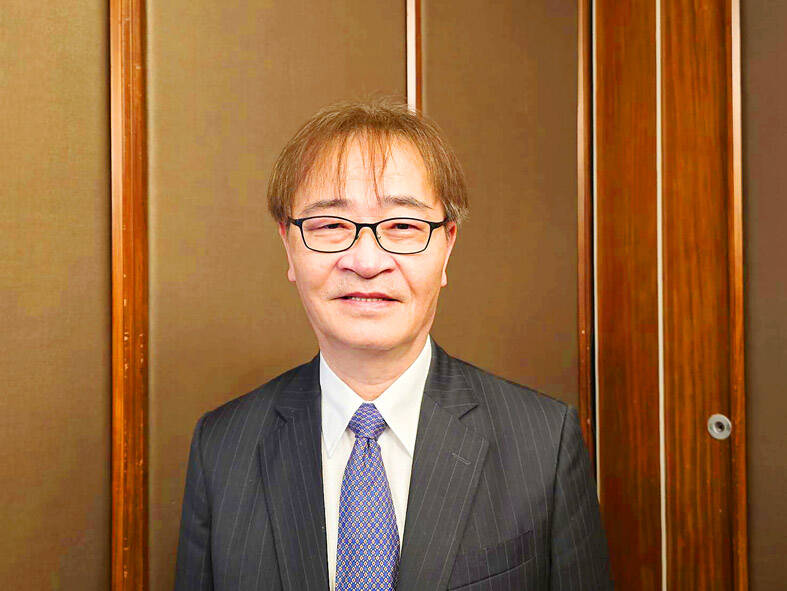Container shipper Wan Hai Lines Ltd (萬海航運) yesterday said it expects freight rates and business to remain healthy in the next few quarters, helped by rerouting needs and inventory building demand to dodge tariff hikes.
“We are positive about the business outlook in next six months and the second half of next year will depend on how the US trade policy pans out,” Wan Hai president Tommy Hsieh (謝福隆) said.
Hsieh attributed his optimism to lingering needs to divert vessels around Africa’s Cape of Good Hope since October last year to avoid attacks by Iran-aligned Houthi militants in the Red Sea.

Photo: CNA
The longer voyages have pushed freight rates higher, he said.
The disruption to container shipping traffic has reduced the industry’s capacity between the Far East and Europe by 20 percent, he said, adding that there appears no solution in sight to the Red Sea crisis.
Meanwhile, US president-elect Donald Trump has pledged to raise tariffs on goods from Canada, Mexico and China, a policy that could drive companies to build up inventory to circumvent higher costs later, Hsieh said, adding that such arrangements, seen during Trump’s first term from 2017 to 2021, would support freight rates.
Additionally, the chances of strikes by union dockworkers at ports on the US’ east and gulf coasts are escalating after Trump last week sided with the unions and expressed opposition to automation.
The Shanghai Containerized Freight Index, a critical business gauge for the industry, last week picked up 22.63 points, encouraged by Trump’s backing.
A strike would disrupt port operations and push up freight rates, Hsieh said.
A strike in October lasted only three days after the US government intervened.
Wan Hai’s earnings ability next quarter might be on par with this quarter, Hsieh said.
Port congestion would worsen next year, he said.
The average stay at Shanghai Port, the world’s largest, is three to four days, while it is three to five days at Singapore Port, Hsieh said, adding that Asian economies rely heavily on exports of raw materials and semi-finished goods.
A rise in the use of large vessels by shippers to save costs is also contributing to port congestion as docks are falling behind in processing efficiency, he said.
Furthermore, costs to charter cargo vessels this year have doubled from last year, reflecting tight supply, Hsieh said.
The backdrop would keep operating costs and freight rates high, he added.
Wan Hai runs ship and container rental businesses, shipping agencies, ship and container trading businesses, and port container terminal operations.
The company reported net income of NT$34.62 billion (US$1.07 billion) in the first three quarters of this year, or earnings per share of NT$6.57, reversing losses from the same period last year.

SETBACK: Apple’s India iPhone push has been disrupted after Foxconn recalled hundreds of Chinese engineers, amid Beijing’s attempts to curb tech transfers Apple Inc assembly partner Hon Hai Precision Industry Co (鴻海精密), also known internationally as Foxconn Technology Group (富士康科技集團), has recalled about 300 Chinese engineers from a factory in India, the latest setback for the iPhone maker’s push to rapidly expand in the country. The extraction of Chinese workers from the factory of Yuzhan Technology (India) Private Ltd, a Hon Hai component unit, in southern Tamil Nadu state, is the second such move in a few months. The company has started flying in Taiwanese engineers to replace staff leaving, people familiar with the matter said, asking not to be named, as the

The prices of gasoline and diesel at domestic fuel stations are to rise NT$0.1 and NT$0.4 per liter this week respectively, after international crude oil prices rose last week, CPC Corp, Taiwan (台灣中油) and Formosa Petrochemical Corp (台塑石化) announced yesterday. Effective today, gasoline prices at CPC and Formosa stations are to rise to NT$27.3, NT$28.8 and NT$30.8 per liter for 92, 95 and 98-octane unleaded gasoline respectively, the companies said in separate statements. The price of premium diesel is to rise to NT$26.2 per liter at CPC stations and NT$26 at Formosa pumps, they said. The announcements came after international crude oil prices

SinoPac Financial Holdings Co (永豐金控) is weighing whether to add a life insurance business to its portfolio, but would tread cautiously after completing three acquisitions in quick succession, president Stanley Chu (朱士廷) said yesterday. “We are carefully considering whether life insurance should play a role in SinoPac’s business map,” Chu told reporters ahead of an earnings conference. “Our priority is to ensure the success of the deals we have already made, even though we are tracking some possible targets.” Local media have reported that Mercuries Life Insurance Co (三商美邦人壽), which is seeking buyers amid financial strains, has invited three financial

CAUTION: Right now, artificial intelligence runs on faith, not productivity and eventually, the risk of a bubble will emerge,’ TIER economist Gordon Sun said Taiwanese manufacturers turned more optimistic last month, ending a five-month streak of declining sentiment as concerns over US tariffs, currency volatility and China’s overcapacity began to ease, the Taiwan Institute of Economic Research (TIER) said yesterday. The manufacturing business confidence index rose 1.17 points from June to 86.8, its first rebound since February. TIER economist Gordon Sun (孫明德) attributed the uptick to fading trade uncertainties, a steadier New Taiwan dollar and reduced competitive pressure from Chinese producers. Taiwan’s semiconductor industry is unlikely to face significant damage from Washington’s ongoing probe into semiconductors, given the US’ reliance on Taiwanese chips to power artificial